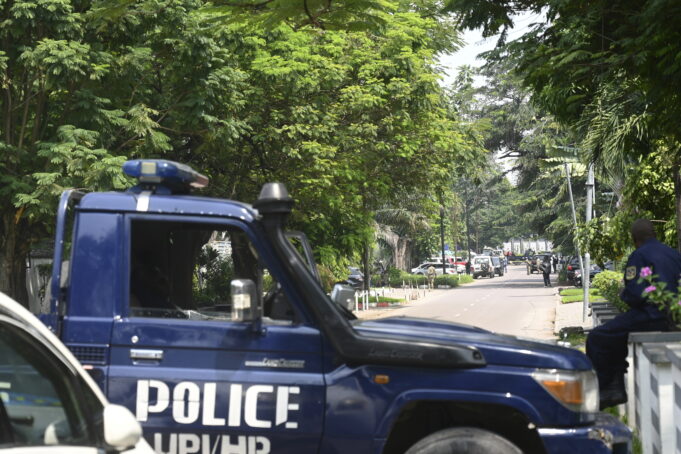Three Americans involved in a brazen June attack on Congo’s presidential palace formed an unlikely trio under the leadership of the African country’s eccentric opposition figure, Christian Malanga Musumari.
Malanga dabbled unsuccessfully in gold mining in Mozambique and used car sales in the USA—before persuading his Utah-born son, a former high school football player, to join him in a foiled coup attempt, according to published reports.
The ill-planned coup abruptly ended when Malanga—who referred to himself as the “President of New Zaire,” in exile—was killed and 50 other perpetrators, including the three Americans, were arrested. Reportedly, on social media, Malanga previously threatened to overthrow the Congo government, but in 2017 called off an attempted coup, a Congolese army spokesperson said.
According to voanews.com, “Malanga described himself as the organizer of the United Congolese Party, a movement aimed at organizing emigres like him against the ‘current Congolese dictatorship government regime.’
He also described himself as president of the ‘New Zaire’ (former name of DRC) government in exile and published a manifesto with plans for creating business opportunities and reforming Congo’s security services.”
Several news reports, including Al Jazeera stated that “analysts are unsure of what to make of the seemingly amateur attack” by Malanga’s mercenary group.
Some reports speculated that Malanga had been set up or betrayed in the weekend attack, given the implausible way it was carried out.
According to Al Jazeera, “Instead of attacking strategic sites like the two airports in Kinshasa, the military camps and the RTNC (national broadcaster), the Malanga commando operation headed towards targets without stakes to overthrow the power,”
Said Albert Malukisa Nkuku, a professor at the Catholic University of the Congo, who pointed out that DRC presidents have rarely used the official residence, where the failed coup took place, because of security concerns.
Photos released on social media show the seized passport of another U.S. national, Benjamin Rueben Zalman-Polun, who has served in Israel’s Defense Force (IDF), and who was allegedly involved in the May 19 attack. In a 2022 article in Africa Intelligence, Zalman-Polun was identified as a “cannabis entrepreneur” and a business associate of Malanga in their gold mine venture that never materialized.
And, according to straturka.com, a news platform based in Istanbul, Türkiye, “Reuben works for former head of Israel’s Mossad agency, Yossi Cohen an Israeli billionaire … Dan Gertler.”
In 2022, the Middle East Monitor reported that, according to Haaretz, the former head of Israel’s Mossad spy agency, Yossi Cohen was deported from the DRC in 2019 after he was suspected of planning a coup against the country’s president, but that “details of the visit have been covered up by the military censor in Israel until now.”
The article stated, “Israeli news outlet The Marker said that Cohen was deported by President Felix Tshisekedi after his third suspicious visit to the Congo leader’s office. Cohen’s visits on Israel’s behalf were apparently “controversial, problematic and some would even say dubious.”
Additionally, “Two of Cohen’s visits were exposed by Bloomberg in the first instance. It said that he was accompanied by Jewish billionaire Dan Gertler, who is suspected by the British authorities of paying $360 million in exchange for mining rights in the DRC.
The U.S. and Swiss authorities suspect Gertler of similar crimes, but Cohen worked to get the U.S. administration to remove the sanctions it imposed on Gertler in late 2017. The sanctions were removed in the last minutes of Donald Trump’s presidency.”
Three days before the May 2024 attempted coup, the New York Times published an article with the headline: “Seeking Access to Congo’s Metals, White House Aims to Ease Sanctions.” The sub-headline of the article read, “A deal to allow the Israeli billionaire Dan Gertler to cash out his mining positions in the Democratic Republic of Congo has enraged human rights activists and some government officials.”
So, three years after the Biden administration tightened sanctions on the Israeli mining executive “for corrupt business practices in the DRC,” (according to the New York Times), they have a change of heart, reverse the sanctions and offer Gertler a deal to possibly bolster the supply of a metal vital to electric vehicles?
According to the New York Times article, those in the Biden administration pushing for the settlement deal see it as a solution to a competitive disadvantage for the United States, that could only grow as automotive manufacturers such as China, “continue to expand their production of electric vehicles. And it is in keeping with the administration’s policy positions that embrace alternative energy solutions to fossil fuels.”
However, the deal “also illustrates the compromises that world leaders often acquiesce to when efforts to hold individuals accountable for their actions collide with the political and economic interests of their countries,” the article stated.
Follow @JehronMuhammad on X, formerly Twitter













